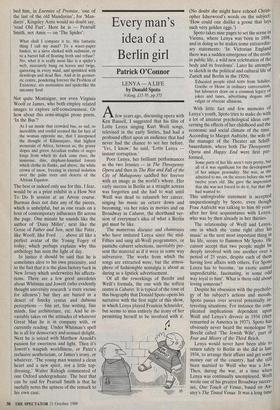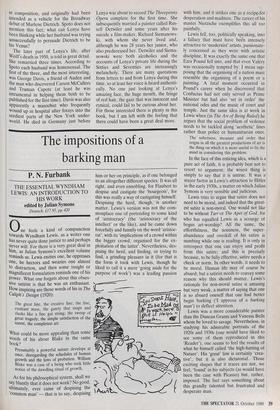Every man's idea of a
Berlin girl
Patrick O'Connor
LENYA — A LIFE by Donald Spoto Viking, £15.95, pp.371
Afew years ago, discussing opera with Ken Russell, I suggested that his film of Lotte Lenya singing Kurt Weill songs, televised in the early Sixties, had had a profound effect upon an audience that had never had the chance to see her before. `Yes, I know,' he said, `Lotte Lenya instant corruption.'
Poor Lenya, her brilliant performances as the two Jennies — in The Threepenny Opera and then in The Rise and Fall of the City of Mahagonny saddled her forever with an image as the world's whore. Her early success in Berlin as a straight actress was forgotten and she had to wait until Weill was dead to relaunch her career, singing his music an octave down and becoming, via her roles in movies and on Broadway in Cabaret, the shorthand ver- sion of everyman's idea of what a Berlin girl must be like.
The numerous diseuses and chanteuses who have imitated Lenya since the mid- Fifties and sung all-Weill programmes, or pastiche cabaret selections, inevitably pre- sent the material as if it were in some way subversive. The works from which the songs are extracted were, but the atmos- phere of fashionable nostalgia is about as daring as a lipstick advertisement.
Of all the reworkings of Brecht and Weill's formula, the one with the softest centre is Cabaret. It is typical of the tone of this biography that Donald Spoto opens his narrative with the first night of this show, in which Lenya played Fraulein Schneider, but seems to miss entirely the irony of her permitting herself to be involved with it. (No doubt she might have echoed Christ- opher Isherwood's words on the subject: `How could one dislike a goose that lays such very golden eggs.') Spoto takes nine pages to set the scene in Vienna, where Lenya was .born in 1898, and in doing so he makes some extraordin- ary statements: 'In Victorian England there was a sudden emergence of the erotic in public life, a wild new celebration of the body and its freedoms'. Later he attempts to sketch in the political and cultural life of Zurich and Berlin in the 1920s:
Educated people cited texts from Schiller, Goethe or Heine in ordinary conversation, but labourers draw on a common legacy of jokes and tunes, advertising slogans and vulgar or obscene allusions.
With little fact and few memoirs of Lenya's youth, Spoto tries to make do with a lot of amateur psychological ideas con- cerning the effects of her childhood and the economic and social climate of the time. According to Margot Aufricht, the wife of the manager of the Theater am Schiff. bauerdamm, where both The Threepenny Opera and Happy End were first per- formed, Some parts of her life aren't very pretty, but all of it was significant for the development of her unique pesonality. She was, as she admitted to me, on the streets before she was twelve years old. She gave the impression that she was not forced to do it, but that she had wanted to.
This unforgivable statement is accepted unquestioningly by Spoto, even though Frau Aufricht was talking to him 60 years after her first acquaintance with Lenya, who was by then already in her thirties.
The relationship of Weill and Lenya, one in which she 'came right after his music' as the next most important thing in his life, seems to flummox Mr Spoto. He cannot accept that two people might be deeply involved with one another over a period of 25 years, despite each of them having love affairs with others. For Spoto Lenya has to become, 'an exotic animal unpredictable, fascinating, in some odd way loyal to him'. What is there odd about loving someone?
Despite his obsession with the psycholo- gy of his subject's actions and moods, Spoto passes over several potentially in- teresting situations. For instance the com- plicated implications dependent upon Weill and Lenya's divorce in 1934 (they remarried in America in 1937). Spoto has obviously never heard the monologue by Brecht called 'The Jewish Wife% part of Fear and Misery of the Third Reich. Lenya would never have been able to return safely to Berlin as she did in late 1934, to arrange their affairs and get some money out of the country, had she still been married to Weill who was a Jew. Then, during the war, at a time when Lenya was continually unemployed, Weill wrote one of his greatest Broadway succes- ses, One Touch of Venus, based on An- stey's The Tinted Venus. It was a long time in composition, and originally had been intended as a vehicle for the Broadway debut of Marlene Dietrich. Spoto does not mention this fact; what can Lenya have been thinking while her husband was trying unsuccessfully to persuade Dietrich to be his Venus?
The later part of Lenya's life, after Weill's death in 1950, is told in great detail. She remarried three times. According to Spoto each husband was homosexual. The first of the three, and the most interesting, was George Davis, a friend of Auden and the man who discovered Carson McCullers and Truman Capote (at least he was intrumental in helping them both to be published for the first time). Davis was also apparently a masochist who frequently wound up in hospital after forays into the seediest parts of the New York under- world. He died in Germany just before
Lenya was about to record The Threepenny Opera complete for the first time. She subsequently married a painter called Rus- sell Detwiler and some years after his suicide a film-maker, Richard Siemanows- ki, with whom she never lived and, although he was 28 years her junior, who also predeceased her. Detwiler and Siema- nowski were both alcoholics and the accounts of Lenya's private life during the Sixties and Seventies are increasingly melancholy. There are many quotations from letters to and from Lenya during this time, so at least her voice is heard authenti- cally. No one just looking at Lenya's amazing face, the huge mouth, the fringe of red hair, the gaze that was innocent and cynical, could fail to be curious about her. For those interested there is plenty in this book, but I am left with the feeling that there could have been a great deal more.



























































 Previous page
Previous page